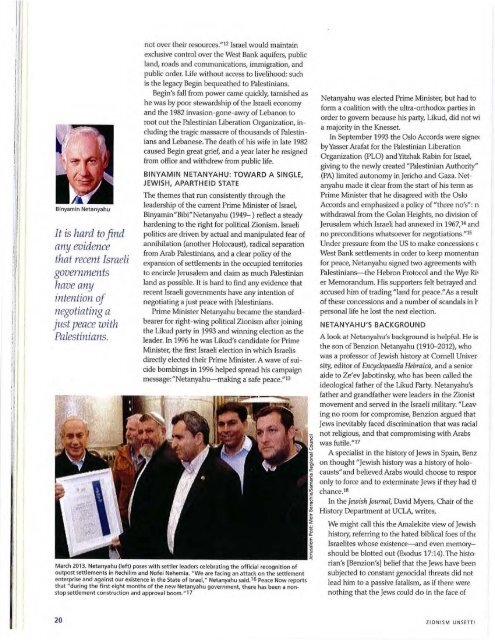zionism_unsettled_scan
zionism_unsettled_scan
zionism_unsettled_scan
Create successful ePaper yourself
Turn your PDF publications into a flip-book with our unique Google optimized e-Paper software.
I<br />
II<br />
: I<br />
Binyamin Netanyahu<br />
It is hard to find<br />
any evidence<br />
that recent Israeli<br />
governments<br />
have any<br />
intention of<br />
negotiating a<br />
just peace with<br />
Palestinians.<br />
not over their resources."12 Israel would maintain<br />
exclusive control over the West Bank aquifers, public<br />
land, roads and communications, immigration, and<br />
public order. Life without access to livelihood: such<br />
is the legacy Begin bequeathed to Palestinians.<br />
Begin's faU from power came quickly, tarnished as<br />
he was by poor stewardship of the Israeli economy<br />
and the 1982 invasion-gone-awry of Lebanon to<br />
root out the Palestinian Liberation Organization, including<br />
the tragic massacre of thousands of Palestinians<br />
and Lebanese. The death of his wife in late 1982<br />
caused Begin great grief, and a year later he resigned<br />
from office and withdrew from public life.<br />
BINYAMIN NETANYAHU: TOWARD A SINGLE,<br />
JEW ISH, A PARTHEID STATE<br />
The themes that run consistently through the<br />
leadership of the current Prime Minister of Israel,<br />
Binyamin"Bibi"Netanyahu (1949-) reflect a steady<br />
hardening to the right for political Zionism. Israeli<br />
politics are driven by actual and manipulated fear of<br />
annihilation (another Holocaust), radical separation<br />
from Arab Palestinians, and a clear policy of the<br />
expansion of settlements in the occupied territories<br />
to encircle Jerusalem and claim as much Palestinian<br />
land as possible. It is hard to find any evidence that<br />
recent Israeli governments have any intention of<br />
negotiating a just peace with Palestinians.<br />
Prime Minister Netanyahu became the standardbearer<br />
for right-wing political Zionism after joining<br />
the Likud party in 1993 and winning election as the<br />
leader. In 1996 he was Likud's candidate for Prime<br />
Minister, the first Israeli election in which Israelis<br />
directly elected their Prime Minister. A wave of suicide<br />
bombings in 1996 helped spread his campaign<br />
message:"Netanyahu- making a· safe peace."13<br />
March 2013. Netanyahu (left) poses with settler lea ders ce lebrating the official recognition of<br />
outpost settlements in Rechilim and Nofei Nehemia . "We are facing an attack on the settlement<br />
enterprise and against our existence in the State of Israel," Netanya hu said.16 Peace Now reports<br />
that "during the first eight months of the new Netanyahu government, there has been a nonstop<br />
settlement construction and approva l boom ." 17<br />
Netanyahu was elected Prime Minister, but had to<br />
form a coa lition with the ultra-orthodox parties in<br />
order to govern because his party, Likud, did not wi<br />
a majority in the Knesset.<br />
[n September 1993 the Oslo Accords were signe,<br />
byYasser Arafat for the Palestinian Liberation<br />
O rganization (PLO) and Yitzhak Rabin for Israel,<br />
giving to the newly created "Palestinian Authority"<br />
(PA) limited autonomy in Jericho and Gaza. Netanyahu<br />
made it clear from the start of his term as<br />
Prime Minister that he disagreed with the Oslo<br />
Accords and emphasized a policy of "three no's": n<br />
withdrawal from the Golan Heights, no division of<br />
Jerusalem which Israeli had annexed in 1967/ 14 and<br />
no preconditions whatsoever for negotiations." lS<br />
Under pressure from the US to make concessions c<br />
West Bank settlements in order to keep momentun<br />
for peace, Netanyahu signed two agreements with<br />
Palestinians-the Hebron Protocol and the Wye Ri'<br />
er Memorandum. His supporters felt betrayed and<br />
accused him of trading "land for peace." As a result<br />
of th ~~e concessions and a number of <strong>scan</strong>dals in t<br />
personal life he lost the next election.<br />
NETANYAHU'S BACKGROUND<br />
A look at Netanyahu's background is helpful. He is<br />
the son of Benzion Netanyahu (1910-2012), who<br />
was a professor of Jewish history at Cornell University,<br />
edi tor of Encyclopaedia Hebraica, and a senior<br />
aide to Ze'ev jabotinsky, who has been called the<br />
ideological father of the Likud Party. Netanyahu's<br />
father and grandfather were leaders in the Zionist<br />
movement and served in the Israeli military. "Leav·<br />
ing no room for compromise, Benzion argued that<br />
Jews inevitably faced discrimination that was racial<br />
not religious, and that compromising with Arabs<br />
was fuhle." 17<br />
A specialist in the history of Jews in Spain, Benz<br />
on thought "jewish history was a history of holocausts"<br />
and believed Arabs would choose to respor<br />
only to force and to exterminate jews if they had tl<br />
chance. 1s<br />
In the Jewish Journal, David Myers, Chair of the<br />
History Departme nt at UCLA, writes,<br />
We might call this the Amalekite view of Jewish<br />
history, referring to the hated biblical foes of th,<br />
Israelites whose existence- and even memoryshould<br />
be blotted out (Exodus 17:14).The historian's<br />
[Benzion's) belief that the jews have been<br />
subjected to constant genocidal threats did not<br />
lead him to a passive fatalism, as if there were<br />
nothing that the jews could do in the face of<br />
20<br />
ZIONISM UN5ETTI


